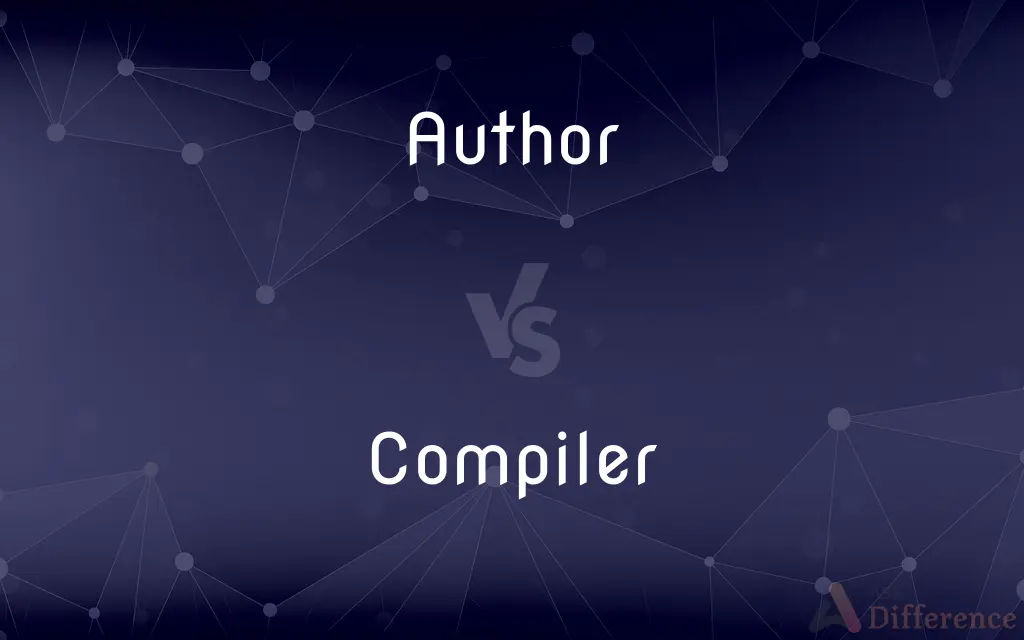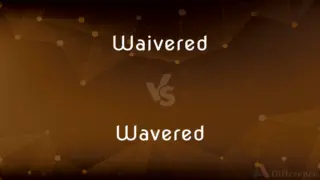Author vs. Compiler — What's the Difference?
By Maham Liaqat & Fiza Rafique — Updated on March 19, 2024
An author creates original content, while a compiler assembles information or works from various sources.

Difference Between Author and Compiler
Table of Contents
ADVERTISEMENT
Key Differences
An author is someone who originates or creates content, such as books, articles, or stories, drawing from their own ideas, research, or imagination. This process involves a high degree of creativity and originality, as the author develops characters, plots, or concepts that are unique to their work. On the other hand, a compiler collects and organizes existing materials or data, often from multiple sources, into a coherent format without necessarily adding original content. This could involve compiling an anthology of poetry, a database of research findings, or a software program from various pre-written code segments.
Authors often express their personal voice, style, and perspective through their writings, making each work distinctive. The value in authorship lies in the novel insights, stories, and expressions brought forth. Conversely, compilers focus on the selection, organization, and presentation of existing material. Their skill lies in their ability to curate and assemble content in a way that serves a specific purpose or audience, such as a compiler of a textbook who selects relevant articles and studies to provide a comprehensive overview of a subject.
The role of an author can sometimes overlap with that of a compiler, especially in academic or non-fiction writing, where authors might integrate existing knowledge with their own analysis or synthesis. However, even in these cases, the author's contribution includes original interpretation or argumentation, setting it apart from mere compilation. In contrast, a compiler's work, while valuable, is primarily recognized for its utility in bringing together and organizing information, rather than for the creation of new ideas or content.
In the realm of software development, the distinction becomes more technical. An author may write original code, developing new software applications or systems. A compiler in this context refers to a specialized computer program that translates written code from a high-level programming language (understandable by humans) into a low-level language (machine code) that can be executed by a computer. This distinction underscores the different nature of creativity and synthesis in the respective roles.
The appreciation of an author's work often involves recognizing the creativity, insight, and unique perspective they bring to their subject matter. For compilers, appreciation comes from the ability to effectively gather, organize, and present information, making it accessible and useful to others. Both roles are crucial in their domains, whether in literature, academia, or technology, highlighting the diverse ways in which content can be generated and shared.
ADVERTISEMENT
Comparison Chart
Definition
Creates original content through writing.
Gathers and organizes existing information or code.
Key Skill
Creativity and originality.
Organization and curation.
Output
Novels, articles, research papers.
Anthologies, databases, software executables.
In Literature
Writes stories, books, essays.
Assembles works by various authors into a collection.
In Technology
Writes original code or content.
Translates high-level code into machine-executable code.
Compare with Definitions
Author
Someone who writes articles or essays.
He is a frequent author of opinion pieces in the newspaper.
Compiler
An assembler of information from various sources.
The compiler of the encyclopedia spent years gathering data.
Author
A creator of original written works.
The author published her debut novel last year.
Compiler
Someone who organizes contributions into a single volume.
She acted as the compiler for the poetry anthology.
Author
A researcher writing scientific papers.
The leading author of the study presented their findings at the conference.
Compiler
A program that translates source code to machine code.
The Java compiler converts Java code into bytecode.
Author
A content creator for digital media.
As a content author, she produces engaging articles for the web.
Compiler
An editor compiling articles for a journal.
The compiler selected the most impactful research for the issue.
Author
A playwright writing scripts for the theater.
The celebrated author is known for her compelling dramas.
Compiler
A person who consolidates laws or regulations.
The legal compiler updated the code with the newest statutes.
Author
An author is the creator or originator of any written work such as a book or play, and is also considered a writer. More broadly defined, an author is "the person who originated or gave existence to anything" and whose authorship determines responsibility for what was created.
Compiler
In computing, a compiler is a computer program that translates computer code written in one programming language (the source language) into another language (the target language). The name "compiler" is primarily used for programs that translate source code from a high-level programming language to a lower level language (e.g., assembly language, object code, or machine code) to create an executable program.There are many different types of compilers which produce output in different useful forms.
Author
The writer of a book, article, or other text.
Compiler
One that compiles
A compiler of anthologies.
Author
One who practices writing as a profession.
Compiler
(Computers) A program that translates another program written in a high-level language into machine language so that it can be executed.
Author
One who writes or constructs an electronic document or system, such as a website.
Compiler
One who compiles.
A compiler of poetry anthologies
My favourite crossword compiler
Author
An originator or creator, as of a theory or plan.
Compiler
(compilation) A computer program which transforms source code into object code.
Author
Author God.
Compiler
One who compiles; esp., one who makes books by compilation.
Author
To write or be the author of (a published text).
Compiler
A computer program that decodes instructions written in a higher-level computer language to produce an assembly-language program or an executable program in machine language.
Author
To write or construct (an electronic document or system)
Authored the company's website.
Compiler
A person who compiles (or writes for) encyclopedias
Author
The originator or creator of a work, especially of a literary composition.
The copyright of any original writing belongs initially and properly to its author.
Have you read any Corinthian authors?
Compiler
(computer science) a program that decodes instructions written in a higher order language and produces an assembly language program
Author
Someone who writes books for a living.
Author
Principal.
Author
(obsolete) One's authority for something: an informant.
Author
To create a work as its author.
Author
The beginner, former, or first mover of anything; hence, the efficient cause of a thing; a creator; an originator.
Eternal King; thee, Author of all being.
Author
One who composes or writes a book; a composer, as distinguished from an editor, translator, or compiler.
The chief glory of every people arises from its authors.
Author
The editor of a periodical.
Author
An informant.
Author
To occasion; to originate.
Such an overthrow . . . I have authored.
Author
To tell; to say; to declare.
More of him I dare not author.
Author
Writes (books or stories or articles or the like) professionally (for pay)
Author
Someone who originates or causes or initiates something;
He was the generator of several complaints
Author
Be the author of;
She authored this play
Common Curiosities
Do compilers add any original content?
Typically, compilers focus on organizing existing content, but they may add introductions, annotations, or commentary to provide context.
How is a compiler different from an editor?
A compiler primarily gathers and organizes content, while an editor also revises and refines the content for clarity, coherence, and style.
Is compiling less creative than authoring?
While compiling may involve less original content creation, it requires a different type of creativity in curating and organizing information effectively.
Can an author also be a compiler?
Yes, an author can act as a compiler when they gather and organize information from various sources, in addition to creating original content.
Can a software author be considered an author in the traditional sense?
Yes, in the context of creating original code or software, a programmer can be considered an author due to the creative and intellectual effort involved.
How do compilers ensure the quality of the content they compile?
Compilers often apply criteria for selection, rely on reputable sources, and may consult experts to ensure the quality and relevance of the compiled content.
How has technology affected the roles of authors and compilers?
Technology has expanded the tools and platforms available for both roles, from digital publishing and content management systems to advanced programming languages and compilers.
What ethical considerations apply to both authors and compilers?
Both must consider the accuracy, sourcing, and presentation of their content, avoiding plagiarism and ensuring proper attribution of sources.
How do authors and compilers contribute to education?
Authors provide original insights and knowledge, while compilers organize and present a breadth of information, aiding in learning and research.
How do market trends affect authors and compilers differently?
Market trends can influence the demand for certain types of content, affecting authors in their choice of topics and compilers in the materials they select for assembly.
How do copyright laws affect authors and compilers?
Copyright laws protect the rights of authors to their original content, while compilers need to ensure they have permission to use existing works.
Is a compiler always a person?
In literature and research, a compiler is a person, but in software development, a compiler is a computer program that translates code.
Are all authors recognized the same way?
Recognition can vary widely depending on the author's field, the originality and impact of their work, and the audience's reception.
Can the role of a compiler be automated?
In some contexts, especially in software, certain aspects of compilation can be automated, but human judgment and curation are often needed for quality and relevance.
Share Your Discovery

Previous Comparison
Prank vs. Hack
Next Comparison
Waivered vs. WaveredAuthor Spotlight
Written by
Maham LiaqatCo-written by
Fiza RafiqueFiza Rafique is a skilled content writer at AskDifference.com, where she meticulously refines and enhances written pieces. Drawing from her vast editorial expertise, Fiza ensures clarity, accuracy, and precision in every article. Passionate about language, she continually seeks to elevate the quality of content for readers worldwide.














































